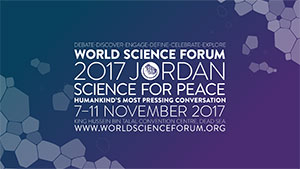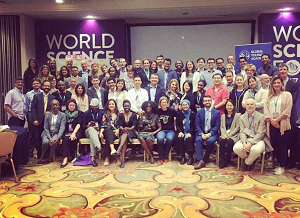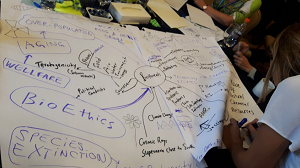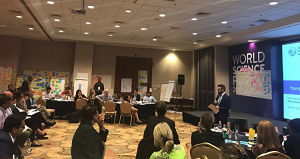


 The World Science Forum 2017 in Jordan, on the theme of ‘Science for Peace’, could not have begun in a better way! One day before the official opening of the Forum, on 6 November, the ‘Young Scientists Leadership Workshop’ took place. This was a full day, interactive event, targeted to young scientists that started bright and early at 9am and concluded by 6pm but, leaving all of us craving for more. The workshop’s theme was on ways of ‘Avoiding the Weaponisation of New Technologies’ but, really, it covered so much more.
The World Science Forum 2017 in Jordan, on the theme of ‘Science for Peace’, could not have begun in a better way! One day before the official opening of the Forum, on 6 November, the ‘Young Scientists Leadership Workshop’ took place. This was a full day, interactive event, targeted to young scientists that started bright and early at 9am and concluded by 6pm but, leaving all of us craving for more. The workshop’s theme was on ways of ‘Avoiding the Weaponisation of New Technologies’ but, really, it covered so much more.
The workshop was co-organized by the Global Young Academy (GYA), the InterAcademy Partnership (IAP), the World Association of Young Scientists (WAYS), the International Consortium of Research Staff Associations (ICoRSA) and UNESCO, and was facilitated by a team of professional facilitators, Maggie, Binyam, Connie, and Tim, members of Knowinnovation/Inclusive Innovation from South Africa, who have great experience in leading science leadership workshops.
The workshop began by allocating participants into groups based on their preference and expertise in one of four subject areas around the theme of ‘De-weaponization’, namely: i) Biotechnology/genome editing/superhumans (bionics), ii) Artificial Intelligence, iii) Cybersecurity and, iv) Biochemical threats (dual use biological warfare).
 During this section of the workshop, participants explored specific questions using a number of collaborative tools for creative problem solving, with an eye on how the tools employed can enhance cross-cultural collaboration and, importantly, what the moderators called ‘cultural dexterity’.
During this section of the workshop, participants explored specific questions using a number of collaborative tools for creative problem solving, with an eye on how the tools employed can enhance cross-cultural collaboration and, importantly, what the moderators called ‘cultural dexterity’.
Participants were asked to think about questions such as: how do you appreciate different types of diversity? How can you creatively solve a problem taking diversity under account? How do you use creative processes and tools for collaborating with diverse groups? How do you communicate for shared understanding?
Among other tools, we had the chance to practice using ‘Mind maps’, to do some ‘Active listening’ using the’3-Way Listening’ tool and to identify our place on the ‘Cultural Continuum’.
 At the end of the session, and after a series of practice rounds and refinements, a rapporteur for each group presented their findings and recommendations in a 2-minute ‘Keys to Al-Khazneh (The Treasury)’ (aka ‘Lion’s Den’) pitch to a high-level panel (see below). From a motivating and stirring number of pitches including ‘How to avoid biothreats’, ‘How to protect from the misuse of CRISPR’ and others, the winning pitch was on ‘Cybersecurity’, and in particular a recommendation to establish an international body to regulate e-currencies such as Bitcoin. The ‘prize’ for the winning pitch was to present it again, this time to all the participants of the World Science Forum during the Young Scientists Plenary Session ‘Young Researchers Identify Skills of the Future to Advance Science Diplomacy and Society’, again organized by IAP, GYA, WAYS, ICoRSA and UNESCO, on Friday 10 November.
At the end of the session, and after a series of practice rounds and refinements, a rapporteur for each group presented their findings and recommendations in a 2-minute ‘Keys to Al-Khazneh (The Treasury)’ (aka ‘Lion’s Den’) pitch to a high-level panel (see below). From a motivating and stirring number of pitches including ‘How to avoid biothreats’, ‘How to protect from the misuse of CRISPR’ and others, the winning pitch was on ‘Cybersecurity’, and in particular a recommendation to establish an international body to regulate e-currencies such as Bitcoin. The ‘prize’ for the winning pitch was to present it again, this time to all the participants of the World Science Forum during the Young Scientists Plenary Session ‘Young Researchers Identify Skills of the Future to Advance Science Diplomacy and Society’, again organized by IAP, GYA, WAYS, ICoRSA and UNESCO, on Friday 10 November.
Overall, the Young Scientists Leadership Workshop provided us with knowledge and skills to maximize our cultural dexterity and make us more competent in the quest for global collaborations. Hopefully these will be skills that we can carry with us to the next World Science Forum and beyond. We also expect that some of the pitches developed will be turned into project proposals and that our teams built over the course of a 9-hour workshop will become fruitful collaborations.
An unforgettable experience!
Credit: Myrtani Pieri, Cyprus
List of expert panel members:
Sir Peter Gluckman
Chief Science Adviser, Office of the Prime Minister of New Zealand
Patricia Reilly
Deputy Chief of Staff for EU Commissioner for Education Culture, Youth and Sport
Michele Zema
Lecturer in Mineralogy and Crystallography, International Union of Crystallography, University of Pavia
Virginia Murray
Public Health Consultant in Global Disaster Risk Reduction, Public Health England
Cathleen Campbell
Visiting Scholar, American Association for the Advancement of Science (AAAS)
Robert Swap
Senior Physical Scientist, NASA- Goddard Space Flight Center
Nader Abuhassan
Senior Research Engineer, NASA- Goddard Space Flight Center